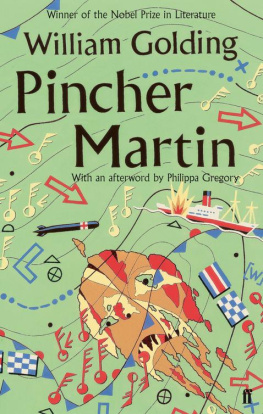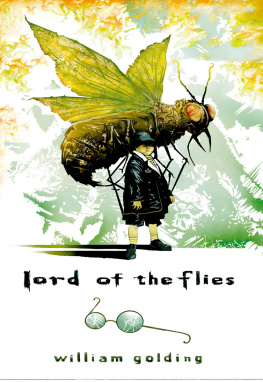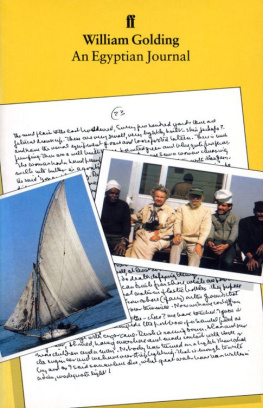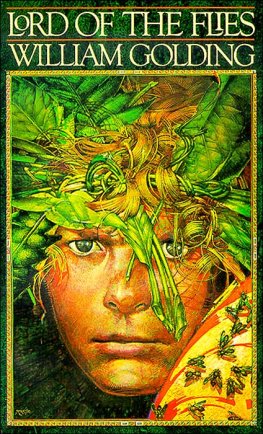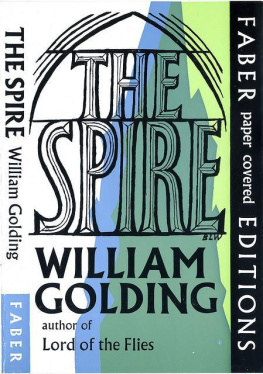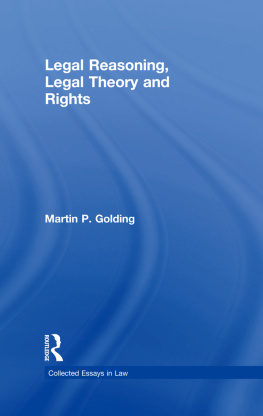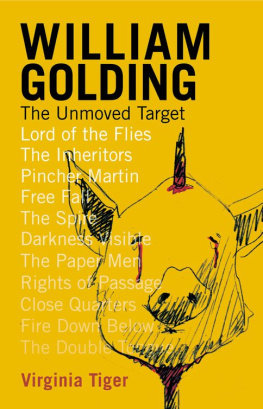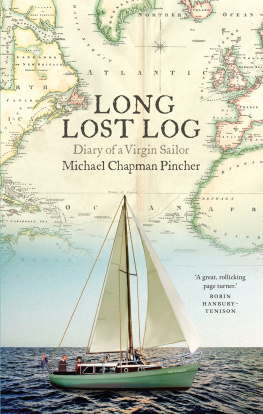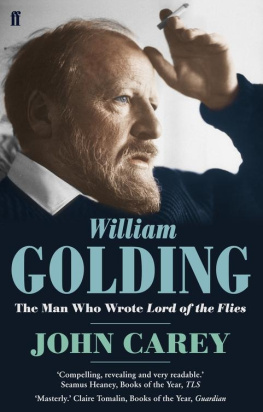William Golding - Pincher Martin
Here you can read online William Golding - Pincher Martin full text of the book (entire story) in english for free. Download pdf and epub, get meaning, cover and reviews about this ebook. year: 2013, publisher: Faber, genre: Detective and thriller. Description of the work, (preface) as well as reviews are available. Best literature library LitArk.com created for fans of good reading and offers a wide selection of genres:
Romance novel
Science fiction
Adventure
Detective
Science
History
Home and family
Prose
Art
Politics
Computer
Non-fiction
Religion
Business
Children
Humor
Choose a favorite category and find really read worthwhile books. Enjoy immersion in the world of imagination, feel the emotions of the characters or learn something new for yourself, make an fascinating discovery.
- Book:Pincher Martin
- Author:
- Publisher:Faber
- Genre:
- Year:2013
- Rating:3 / 5
- Favourites:Add to favourites
- Your mark:
- 60
- 1
- 2
- 3
- 4
- 5
Pincher Martin: summary, description and annotation
We offer to read an annotation, description, summary or preface (depends on what the author of the book "Pincher Martin" wrote himself). If you haven't found the necessary information about the book — write in the comments, we will try to find it.
Pincher Martin — read online for free the complete book (whole text) full work
Below is the text of the book, divided by pages. System saving the place of the last page read, allows you to conveniently read the book "Pincher Martin" online for free, without having to search again every time where you left off. Put a bookmark, and you can go to the page where you finished reading at any time.
Font size:
Interval:
Bookmark:

He was struggling in every direction, he was the centre of the writhing and kicking knot of his own body. There was no up or down, no light and no air. He felt his mouth open of itself and the shrieked word burst out.
Help!
When the air had gone with the shriek, water came in to fill its placeburning water, hard in the throat and mouth as stones that hurt. He hutched his body towards the place where air had been but now it was gone and there was nothing but black, choking welter. His body let loose its panic and his mouth strained open till the hinges of his jaw hurt. Water thrust in, down, without mercy. Air came with it for a moment so that he fought in what might have been the right direction. But water reclaimed him and spun so that knowledge of where the air might be was erased completely. Turbines were screaming in his ears and green sparks flew out from the centre like tracer. There was a piston engine too, racing out of gear and making the whole universe shake. Then for a moment there was air like a cold mask against his face and he bit into it. Air and water mixed, dragged down into his body like gravel. Muscles, nerves and blood, struggling lungs, a machine in the head, they worked for one moment in an ancient pattern. The lumps of hard water jerked in the gullet, the lips came together and parted, the tongue arched, the brain lit a neon track.
Moth
But the man lay suspended behind the whole commotion , detached from his jerking body. The luminous pictures that were shuffled before him were drenched in light but he paid no attention to them. Could he have controlled the nerves of his face, or could a face have been fashioned to fit the attitude of his consciousness where it lay suspended between life and death that face would have worn a snarl. But the real jaw was contorted down and distant, the mouth was slopped full. The green tracer that flew from the centre began to spin into a disc. The throat at such a distance from the snarling man vomited water and drew it in again. The hard lumps of water no longer hurt. There was a kind of truce, observation of the body. There was no face but there was a snarl.
A picture steadied and the man regarded it. He had not seen such a thing for so many years that the snarl became curious and lost a little intensity. It examined the picture.
The jam jar was standing on a table, brightly lit from O.P. It might have been a huge jar in the centre of a stage or a small one almost touching the face, but it was interesting because one could see into a little world there which was quite separate but which one could control. The jar was nearly full of clear water and a tiny glass figure floated upright in it. The top of the jar was covered with a thin membranewhite rubber. He watched the jar without moving or thinking while his distant body stilled itself and relaxed . The pleasure of the jar lay in the fact that the little glass figure was so delicately balanced between opposing forces. Lay a finger on the membrane and you would compress the air below it which in turn would press more strongly on the water. Then the water would force itself farther up the little tube in the figure, and it would begin to sink. By varying the pressure on the membrane you could do anything you liked with the glass figure which was wholly in your power. You could mutter,sink now! And down it would go, down, down; you could steady it and relent. You could let it struggle towards the surface, give it almost a bit of air then send it steadily, slowly, remorselessly down and down.
The delicate balance of the glass figure related itself to his body. In a moment of wordless realization he saw himself touching the surface of the sea with just such a dangerous stability, poised between floating and going down. The snarl thought words to itself. They were not articulate, but they were there in a luminous way as a realization.
Of course. My lifebelt.
It was bound by the tapes under that arm and that. The tapes went over the shouldersand now he could even feel themwent round the chest and were fastened in front under the oilskin and duffle. It was almost deflated as recommended by the authorities because a tightly blown-up belt might burst when you hit the water. Swim away from the ship then blow up your belt.
With the realization of the lifebelt a flood of connected images came backthe varnished board on which the instructions were displayed, pictures of the lifebelt itself with the tube and metal tit threaded through the tapes. Suddenly he knew who he was and where he was. He was lying suspended in the water like the glass figure; he was not struggling but limp. A swell was washing regularly over his head.
His mouth slopped full and he choked. Flashes of tracer cut the darkness. He felt a weight pulling him down. The snarl came back with a picture of heavy seaboots and he began to move his legs. He got one toe over the other and shoved but the boot would not come off. He gathered himself and there were his hands far off but serviceable. He shut his mouth and performed a grim acrobatic in the water while the tracer flashed. He felt his heart thumping and for a while it was the only point of reference in the formless darkness. He got his right leg across his left thigh and heaved with sodden hands. The seaboot slipped down his calf and he kicked it free. Once the rubber top had left his toes he felt it touch him once and then it was gone utterly. He forced his left leg up, wrestled with the second boot and got it free. Both boots had left him. He let his body uncoil and lie limply.
His mouth was clever. It opened and shut for the air and against the water. His body understood too. Every now and then it would clench its stomach into a hard knot and sea water would burst out over his tongue. He began to be frightened againnot with animal panic but with deep fear of death in isolation and long drawn out. The snarl came back but now it had a face to use and air for the throat. There was something meaningful behind the snarl which would not waste the air on noises. There was a purpose which had not yet had time and experience to discover how relentless it was. It could not use the mechanism for regular breathing but it took air in gulps between the moments of burial.
He began to think in gulps as he swallowed the air. He remembered his hands again and there they were in the darkness, far away. He brought them in and began to fumble at the hard stuff of his oilskin. The button hurt and would hardly be persuaded to go through the hole. He slipped the loop off the toggle of his duffle. Lying with little movement of his body he found that the sea ignored him, treated him as a glass figure of a sailor or as a log that was almost ready to sink but would last a few moments yet. The air was regularly in attendance between the passage of the swells.
He got the rubber tube and drew it through the tapes. He could feel the slack and uninflated rubber that was so nearly not holding him up. He got the tit of the tube between his teeth and unscrewed with two fingers while the others sealed the tube. He won a little air from between swells and fuffed it through the rubber tube. For uncounted numbers of swell and hollow he taxed the air that might have gone into his lungs until his heart was staggering in his body like a wounded man and the green tracer was flicking and spinning. The lifebelt began to firm up against his chest but so slowly that he could not tell when the change came. Then abruptly the swells were washing over his shoulders and the repeated burial beneath them had become a wet and splashing slap in the face. He found he had no need to play catch-as-catch-can for air. He blew deeply and regularly into the tube until the lifebelt rose and strained at his clothing. Yet he did not stop blowing at once. He played with the air, letting a little out and then blowing again as if frightened of stopping the one positive action he could take to help himself. His head and neck and shoulders were out of the water now for long intervals. They were colder than the rest of his body. The air stiffened them. They began to shake.
Font size:
Interval:
Bookmark:
Similar books «Pincher Martin»
Look at similar books to Pincher Martin. We have selected literature similar in name and meaning in the hope of providing readers with more options to find new, interesting, not yet read works.
Discussion, reviews of the book Pincher Martin and just readers' own opinions. Leave your comments, write what you think about the work, its meaning or the main characters. Specify what exactly you liked and what you didn't like, and why you think so.

